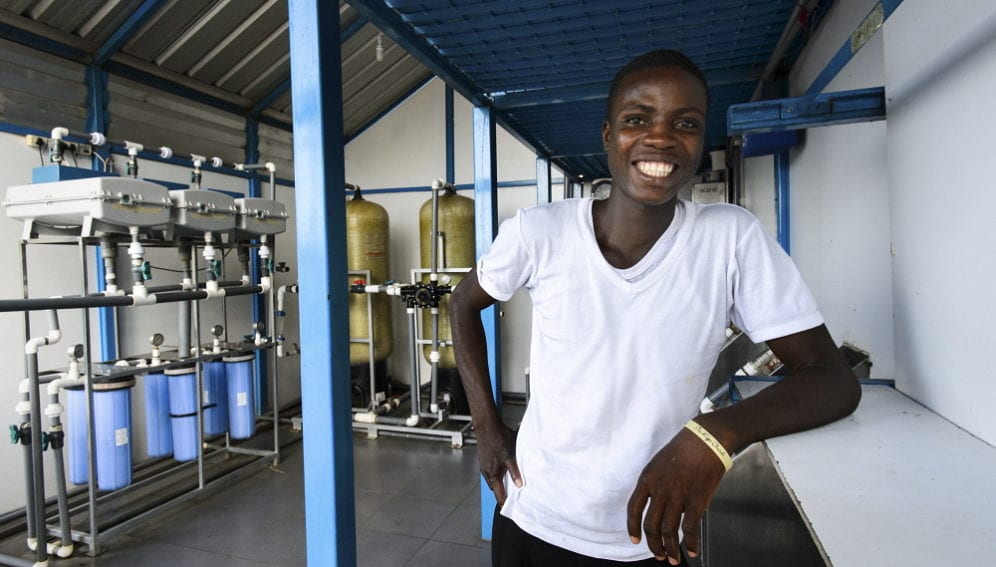By: Aamna Mohdin and Puneet Kollipara
Send to a friend
The details you provide on this page will not be used to send unsolicited email, and will not be sold to a 3rd party. See privacy policy.
[WASHINGTON DC/LONDON] Science took a back seat at the first US-Africa Leaders Summit last week (4-6 August), but high-level calls for increased science cooperation and a chance to speak to top officials have left some African policy experts optimistic about the future.
Although there were no major research-related announcements, a White House statement said the leaders were able to discuss how to “promote skills development, especially in science, technology, research and innovation”.
The summit generated US$37 billion in new investment, including in infrastructure, electricity, public health, and food security.
“The ultimate test will be whether there will be high-level dialogue back in the capitals between presidential offices and national scientific academies.”
Calestous Juma, Harvard Kennedy School
It also provided opportunities to talk about science with top officials.
Melvin Foote, president of the Constituency for Africa, a network that builds support for Africa in the United States, says: “While the ‘science-led agenda’ that we advocated was not front and centre in the discussions around trade and investment, we were able to successfully discuss the science-led agenda in Africa with key stakeholders from Africa and from the United States.”
These included Nkosazana Zuma, the chairperson of the African Union, and a number of African heads of state, he says.
“The science in Africa agenda was also front and centre" in the science symposium held last Thursday at the National Academies in Washington DC, says Zuma.
Calestous Juma, an international development expert at Harvard Kennedy School, United States, who hosted the symposium, tells SciDev.Net: “The most important outcome of the science symposium was its emphasis on evidence-based advice to African leaders. This is a departure from the classical call for more funding to research and development.”
He warns of a growing concern that Africa’s top-level decisions are not systematically supported by scientific advice.
“The symposium successfully underscored the importance of scientific and technical advice to African leaders,” says Juma. “The ultimate test will be whether there will be high-level dialogue back in the capitals between presidential offices and national scientific academies.”
Ian Scoones, director of UK-based research and policy institute the STEPS (Social, Technological and Environmental Pathways to Sustainability) Centre, was more guarded about the summit’s potential impact.
“Investment is crucial for Africa and should be welcomed, but the big question is whether the technology and expertise on offer will be appropriate,” he tells SciDev.Net. “The track record of past interventions is unfortunately extremely mixed.”
South Africa’s lead
At another summit side event, Naledi Pandor, South Africa’s science and technology minister, called for Africa to forge stronger research and business ties in science, technology and innovation (ST&I) with the United States, citing the potential benefits for all parties.
“I think there’s now a golden opportunity to develop new strategic and mutually beneficial African-American scientific partnerships,” she said.
“These are partnerships which would enrich not only our global knowledge base, but also transform scientific disciplines to the benefit of our societies.”
Pandor’s comments come as South Africa aims to ramp up its own scientific aspirations by increasing funding for research and development from its current level of around 0.84 per cent of GDP (gross domestic product) to 1.5 per cent in the next five years. This, she said, is “still behind many of our development partners, but it’s a target that we believe we should aim for”.
Much of South Africa’s scientific push is aimed at capacity building, which carries clear economic development benefits, she said.
Construction of scientific instruments, such as the Southern African Large Telescope, has boosted interest in science education and produced economic opportunity by prompting the building of energy, transport and telecommunications infrastructure, she said.
Pandor suggested that the United States and Africa work to “broaden the range of actors involved in our science partnerships” so they include greater industry representation and to extend cooperation “from fundamental and frontier research to the translation and commercialisation of the results”.
She emphasised the need to develop partnerships that she called “win-win” for both African nations and the United States, and that result in the creation of truly novel technologies and innovations, not mere repackaging or enhancement of older ones.
She also called on Africa and the United States to identify and address legal and policy barriers to cooperation on technology and innovation, such as deficiencies in intellectual-property rights, and to look to expand non-traditional forms of finance, such as venture capital, for technology firms.
Gridlock in Washington
Eddie Bernice Johnson, the top Democrat politician on the science committee within the US Congress’s House of Representatives, also called for stronger US-African ST&I collaboration. She said the International Science and Technology Cooperation Act, which the House approved in July, was one way to do that.
The bill would establish a US body responsible for identifying areas of ST&I cooperation and advancing US science and foreign policy priorities through new international research and training partnerships.
But Washington DC has suffered legislative gridlock that has often made the approval of even non-controversial legislation difficult.
Johnson hinted that there was no guarantee the bill would ultimately become law. The Senate, the upper chamber of Congress, has not acted on the bill, and the same legislation stalled in a previous session of Congress.
“I hope it will continue to move through our political process,” Johnson said. But bill-tracking website GovTrack gives the legislation just a 37 per cent chance of becoming law.














